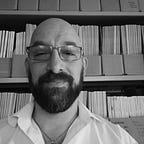The weavers of memories (06)
IV. Critical archival sciences. Searching for new patterns (A)
[This post is the sixth of a series in which I will share a text entitled Los tejedores de memorias (“The weavers of memories”), which I produced as the final work for my master’s degree in Historical Archives and Memory at the Pontificia Universidad Javeriana in Bogota (Colombia). All posts can be viewed on my website, while the original text, complete with quotes and notes, can be downloaded here].
Abigail De Kosnik, PhD in comparative literary studies and professor of new media at UC Berkeley, opens her book Rogue Archives: Digital Cultural Memory and Media Fandom (2016) with a controversial phrase that is a declaration of intent: “Memory has gone rogue”.
Public and collective memory was, until the end of the 20th century, a sort of State property: it was systematically appropriated, fixed to physical supports, bureaucratized, stored, controlled, censored and manipulated by official institutions of knowledge and memory management. Performing these roles, such institutions — including libraries, archives and museums — were (and, at times, continue to be) colonized as well as colonizing spaces. They have functioned as instruments for the implantation of dominant visions and discourses, essential in the construction of ideologies of nation and society, and in the generation and maintenance of particular epistemes. Including the scientific-academic one.
With the emergence of the Internet and its associated media, channels and structures, the scheme of power over knowledge and memory changed radically. The ties that linked collective memory to the State were broken, and other links emerged with new managers, and with other interests, perspectives and visions.
Archivists with no training in archival science and archives that defied all traditional definitions appeared; something similar happened with libraries and museums, and with many other similar spaces for the management of knowledge and histories. Amateurs, fans, pirates and volunteers adhered to this line of thought and action: what De Kosnik calls rogue memory workers.
Through their hands, access policies, priorities, structures, and even values changed. Everything changed. And among other things, rogue archival science was born.
De Kosnik takes the word rogue from the title of the English version of a work by Jacques Derrida, in which the French author points out:
Democracy, the passage to democracy, democratization, will have always been associated with license, with taking too many liberties, with the dissoluteness of the libertine, with liberalism, indeed perversion and delinquency, with malfeasance, with failing to live according to the law, with the notion that ‘everything is allowed,’ that ‘anything goes’.
The idea of rogue, of voyou, of rebel, is then associated with the subversion of the established / imposed order, the overcoming of limits and barriers, and the search for other paths, generally located on the margins, on the peripheries, or below the hegemonic currents.
In the area of knowledge and memory management, such a vision underlies both the most critical archival science and certain currents of librarianship (such as, for example, radical librarianship and progressive librarianship) and museology. Rogue memory workers challenge the rigid ideas, conventions, norms and lines of work of these disciplines and seek to approach their work from more critical, open and plural positions: from queer to decolonial, passing through the underground, and including the claims of contemporary social and environmental movements, the struggles of “subaltern” groups and transdisciplinary studies, among others.
In the field of archival science, the rogue movement began by exploring the potential of digital technologies to “democratize” collective memory. In this way, virtual repositories were built that are constantly and freely accessible to all. Since these spaces do not respond to hegemonic interests but, on the contrary, to other visions, they often preserve and make visible specific fragments of memory — documents belonging to “subcultures” or “minority” groups, for example — or enormous amounts of information that have been hitherto invisible: that is, knowledge consistently excluded or ignored by traditional memory institutions.
The “scandal” generated by such actions in the field of traditional archival science is due to the fact that archives have been displaced from a zone of “exclusivity” to one of “community”. Instead of being closed spaces over which control is maintained, governed by strict rules and norms, with limited access and a firmly written narrative in advance, the archive becomes an information commons: an information system that exists to generate, preserve and disseminate information, with a shared structure that allows anyone to participate in the processes of collection, production and research.
From this perspective of rogue archival science, the knowledge and memory preserved in an archive begin to be understood and used as what they truly are: the property of all and for all. Voices that have been eternally silenced can be heard again, otherness resurfaces, plural views are accepted, and divergent narratives and discourses resonate.
These kinds of actions, according to Derrida’s vision, are the ones that can drive serious and consistent transformations, both social and cultural. And even political. For the rebels, by overcoming the obstacles imposed by the hegemonic systems and getting rid of a good part of their ties, have the capacity to produce changes in many ways.
Thanks to them, as we have seen, collective memory has managed to escape from a monopolistic, biased and dominant use by the State.
Although this is not the only sense in which memory has become rebellious.
[To be continued…]
